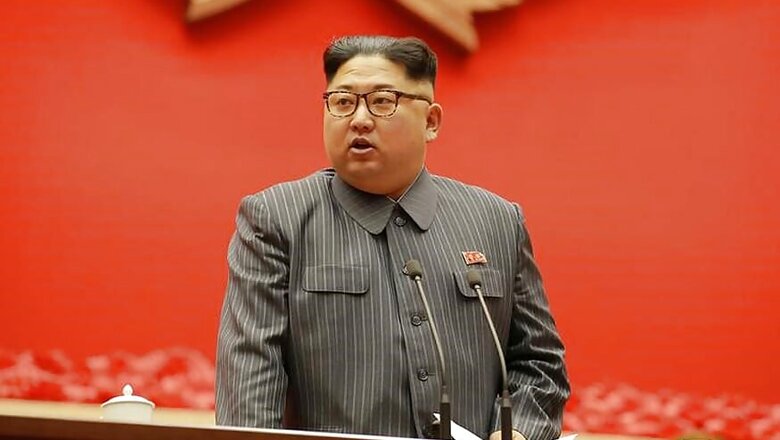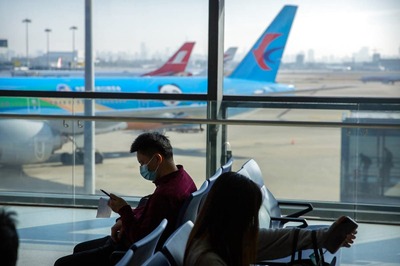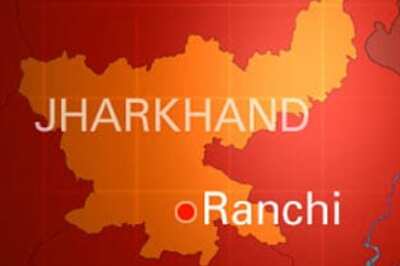
views
Paju, South Korea: North Korean leader Kim Jong Un will meet South Korean President Moon Jae-in at a border village on April 27, the South announced Thursday after the nations agreed on a rare summit that could prove significant in global efforts to resolve a decades-long standoff over the North's nuclear program.
The announcement was made after officials met at the border village of Panmunjom. Few other details were immediately released, but the Koreas plan to hold another preparatory meeting on April 4 to discuss protocol, security and media coverage issues.
The leaders of the two Koreas have held talks only twice since the 1950-53 Korean War, in 2000 and 2007, under previous liberal governments in Seoul. The Korean Peninsula was divided in 1945 into a U.S.-dominated south and Soviet-backed north.
Seoul's Unification Minister Cho Myoung-gyon, one of the three South Korean participants in Thursday's talks, told reporters beforehand that setting up discussions between the leaders on ways to rid the North of its nuclear weapons would be a critical point. The North's three delegates were led by Ri Son Gwon, chairman of a state agency that deals with inter-Korean affairs.
The South's delegation arrived in Panmunjom after their vehicles crossed the heavily guarded border near the southern city of Paju.
Greeting the South Korean officials at the North Korea-controlled Tongilgak building, Ri said that the past 80 days have been filled with "unprecedented historic events" between the rivals, referring to the Koreas resuming dialogue before the Winter Olympics in the South and the agreement on the summit. He expressed hopes for an outcome that would meet the "hope and desire of the nation."
Cho, in response, said officials in the preparatory talks should do their best to set up a successful summit as the "current situation was created by decisions from the highest leaders of the North and South."
The talks follow a surprise meeting this week between Kim and Chinese President Xi Jinping, which appeared to be aimed at improving both countries' positions ahead of Kim's planned meetings with Moon and President Donald Trump.
In setting up separate talks with Beijing, Seoul, Washington, and potentially with Moscow and Tokyo, North Korea may be moving to disrupt any united front among its negotiating counterparts. By reintroducing China, which is the North's only major ally, as a major player, North Korea also gains leverage against South Korea and the United States, analysts say.
In his talks with Xi, Kim may have discussed economic cooperation with China or requested a softening of enforcement of sanctions over the North's nukes and missiles. North Korea also wants Beijing to resist tougher sanctions if the talks with Washington and Seoul fall apart and the North starts testing missiles again.
Chinese State Councilor Yang Jiechi is spending two days in Seoul brefing South Korean officials on the results of the talks between Kim and Xi. Yang is expected to meet Seoul's presidential national security director Chung Eui-yong on Thursday before meeting President Moon on Friday. Moon's spokesman Kim Eui-kyeom in a statement said Seoul welcomes the meeting between Kim and Trump and called it an encouraging sign that Kim expressed a firm willingness for dialogue with South Korea and the United States during his visit to Beijing.
North Korea has yet to officially confirm its interest in a summit between Kim and Trump. In its coverage of the Kim-Xi meeting, the North's state media didn't carry Kim's reported comments about opening dialogue with the United States that were carried in Chinese state media.
It's unclear whether the leaders' meetings could lead to any meaningful breakthrough.
The North's diplomatic outreach comes after an unusually provocative year where it conducted its most powerful nuclear test to date and three intercontinental ballistic missiles designed to target the U.S. mainland. The change in tactics could be an attempt to ease pressure from heavy sanctions and improve its economy.
Washington and Seoul have said Kim previously told South Korean envoys that he was willing to put his nukes up for negotiation in his talks with Trump. However, the North has yet to officially confirm its interest in a summit between Kim and Trump.
There's deep skepticism among some analysts that the North, after years of dogged weapons development, will commit to real denuclearization and then agree to a robust verification regime. North Korea over the past two decades has been repeatedly accused of using disarmament talks as a way to ease outside pressure and win badly needed aid, while all along secretly pushing ahead with its weapons development.
The Koreas agreed to a summit when Moon's envoys visited Kim in Pyongyang earlier this month. The meeting followed a sudden period of inter-Korean warmth over February's Winter Olympics in the South, where the North sent hundreds of officials, including Kim's sister who met with Moon to deliver his brother's desire for a summit.
Using a subsequent visit to the United States, Moon's envoys also brokered a potential meeting between Kim and Trump, who said he would meet the North Korean leader "by May."
The planned summit between Moon and Kim will be preceded by performances of South Korean pop singers in North Korea this Sunday and Tuesday.
About 70 South Korean officials and technicians flew to Pyongyang on Thursday to set up the performance equipment. The South Korean artists performing in the North will include some of the country's most popular pop singers, including Cho Yong-pil, who performed in Pyongyang during a previous era of detente, and girl band Red Velvet.




















Comments
0 comment